How I Persuade Free Roaming
Ducks to Lay Eggs For Me
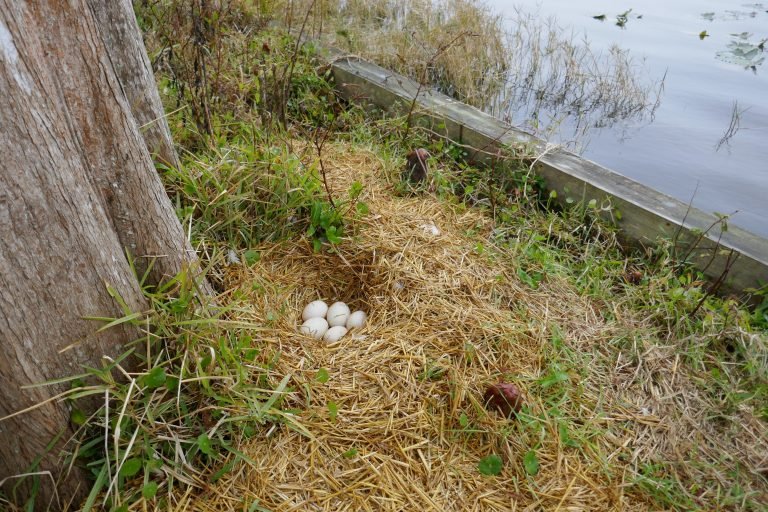
Attracting free roaming, egg-producing ducks to my yard provides me with the joy of their company, a welcome ally in my insect and weed seed pest control efforts, and of course, free, highly nutritious, fresh eggs. Moving to a lake for the first time in my life has put me face to face with free roaming ducks and I’ve learned that they can be trained to produce eggs if their needs are met and they enjoy the green space in which they live.
I have no prior experience with ducks, or raising poultry, and I actually stumbled upon this by going about my daily activities of feeding the birds and mulching my plants with Spanish moss. For most of my first year on the lake, I would throw corn and scratch to the various ducks each day, and noticed a pattern where the females would alternately disappear for a while, usually a couple of weeks or more, and then return with a clutch of hatchlings. Despite looking for their nesting sites, I was never able to find one given my very wet and difficult to navigate neighborhood. I knew they were laying eggs, but they weren’t laying them where I could locate them.
Providing for the ducks needs involves skills, or habits, that you may already possess and already be doing on a daily basis. Bird feeding, if taken a step further, is the main component of keeping the ducks in your green space happy, and hopefully, this also means a nest of eggs on a regular basis.
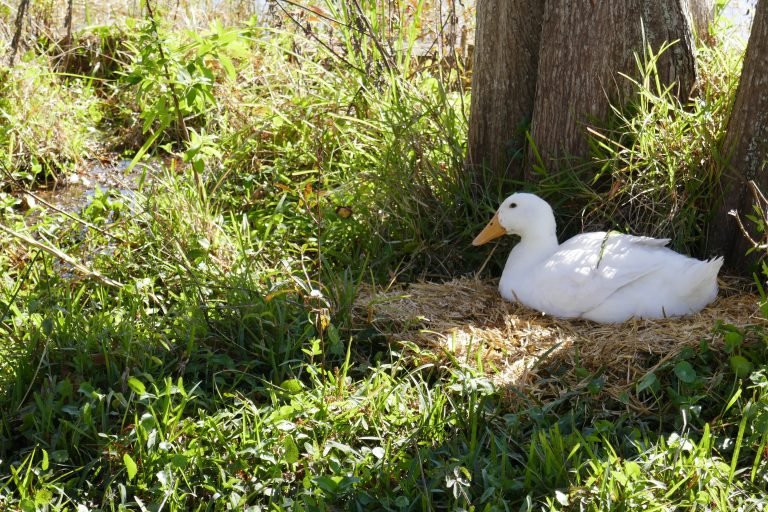
Feeding the birds has always brought me lots of joy, and the ducks are no exception. They make great company while I’m working in the yard. They come by throughout the day, and night, to get a snack, forage the grass, and just visit with me. Honestly it’s the best of both worlds because they feel to me like very self-reliant pets that I don’t have to nurture twenty four hours a day. It takes most of the stress out of pet ownership. Of course, they may not show up tomorrow, and I worry about them constantly, but for now it’s a benefit for both of us and I’m enjoying it.
Getting to learn each of their personalities makes things very interesting and entertaining. I have several female Muscovy ducks that rush up to me, cooing as they approach, when I’m about to put out food, I have one that hops up the steps to find me on the porch, and several that make happy gurgly sounds when they are eating the food I just put out for them.
My adopted Pekin ducks honk when they’re hungry or upset about something. They are such a heart-warming pair that their demanding ways are profoundly missed on the occasional odd day they choose to spend away from the yard.
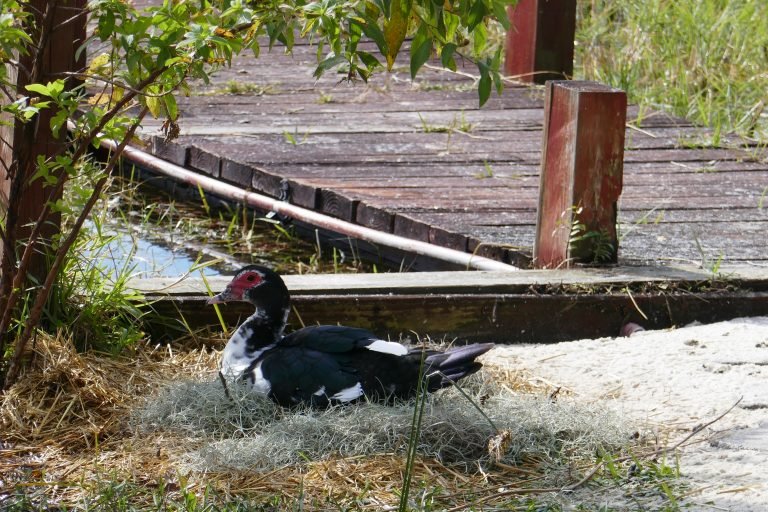
Ducks live very busy lives and they are constantly searching for food on every corner of my property. They love the natural areas of sedges and grasses because it provides the perfect place for them to forage for seeds and insects.
When this first began I bought them duck food pellets and they turned their bills up at it. Over the last several months I’ve tried many different food items from the feed store and the only things they eat with gusto, and daily, are whole kernel corn, five grain scratch, and dried cat food. It seems that everything likes cat food … even the bluegill in the lake splash and jump for it. .
Providing them food and habitat creates an environment which makes them content and they in turn lay eggs for me. Currently, I have a Pekin duck and a Muscovy duck that take turns laying eggs in their favorite nest that I coaxed them to start by ringing my cypress tree with a thick layer of Spanish moss. Once I noticed them laying there I placed a thicker, dryer, layer of straw around the base of the tree.
My gardening habit of mulching with Spanish moss seems to be just what the ducks want for a nesting material. Amending the Spanish moss with straw allows me to remove and replace any wet or soiled nesting material as needed when the Spanish moss is scarce.
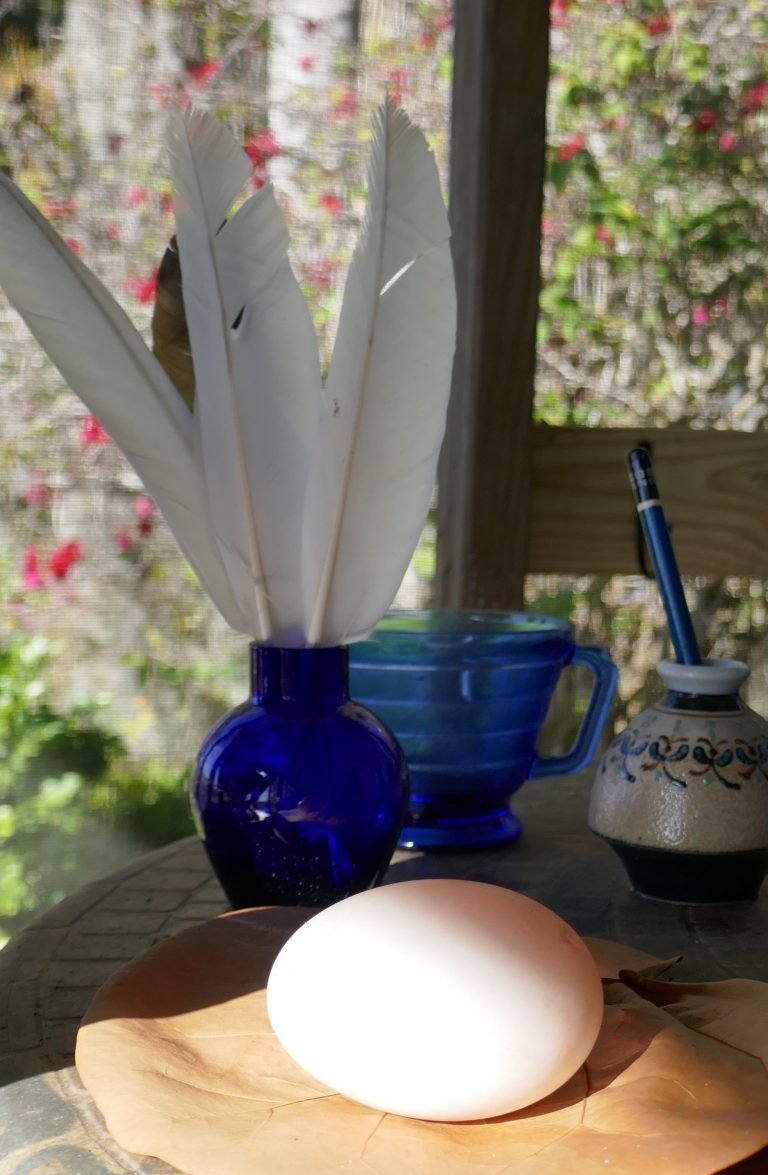
The various ducks have added other bits of plant debris and lots of downy feathers, and it has become a kind of community nest. There are now two separate nests within the ring of straw, and it is common to see two females sitting on eggs at the same time, or even taking turns sitting on the same clutch of eggs.
Neither current nesting female duck stays at the nest for more than an hour or so at a time. They lay during the night and each morning I’m blessed with two, jumbo, breakfast eggs. I wash the eggs with warm water and baking soda to remove the straw debris. The eggs have a darker yolk and thicker white than chicken eggs, which by comparison are also quite watery. Duck omelets and scrambled eggs are noticeably more creamy and richer tasting.
It’s odd having laying ducks that roam freely, but it’s the best way for them as well as myself. We have a symbiotic relationship with mutual benefits. They enjoy roaming free and I feel good about not trapping them inside a pen. Of course, it could all end, at any time. They are free to decide to move on, hungry predators abound, our road has few cars, but they do appear, etc. Nothing lasts forever, but for now at least I get to appreciate and benefit from our relationship and share my habitat with these funny and interesting creatures.
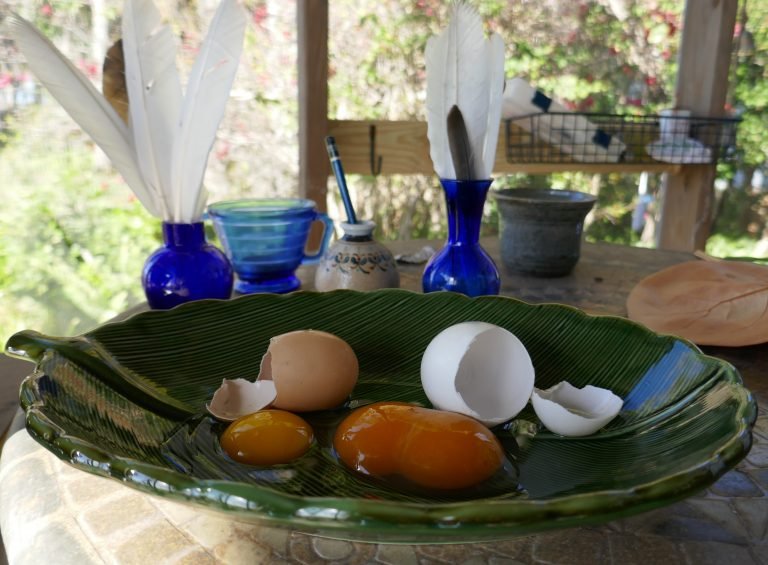
Best of all is knowing that all it required of me was a little food and a dry, relatively protected place, and my visitors would begin showering me with arguably the healthiest food that nature provides. Free roaming duck eggs are a fantastic Florida wild edible.
I have found the ducks to be easy to coax, and persuade with food and bedding material into laying their eggs for me.
This is a total no-brainer that anyone who lives with, or near, a free roaming duck population would be encouraged to try. You will not be disappointed.
